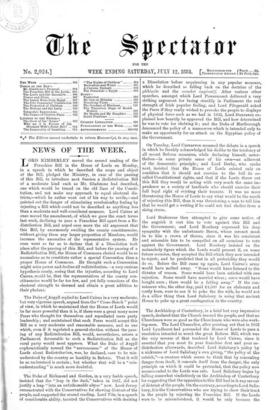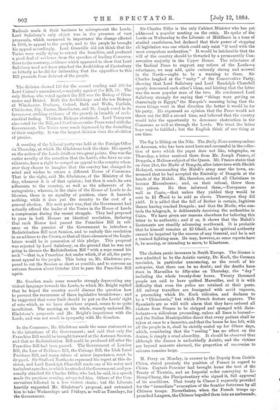The Archbishop of Canterbury, in a brief but very impressive
speech, declared that the Church trusted the people, and that no Churchmen were so good as the Churchmen who were also work- ing-men. The Lord Chancellor, after pointing out that in 1832 Lord Lyndhurst had persuaded the House of Lords to pass a resolution intended to wreck the great Reform Bill, which was the very reverse of that tendered by Lord Cairns, since it asserted that you must fix your franchise first and your re- distribution afterwards, described Lord Salisbury's policy by a nickname of Lord Salisbury's own giving, "the policy of the ostrich,"—a creature which seems to think that by concealing danger from itself, it conceals itself from the danger, the only principle on which it could be pretended, that the policy now recommended to the Lords was safe. Lord Salisbury began by falling somewhat vindictively on the Archbishop of Canterbury for suggesting that the opposition to this Bill had in it any savour of distrust of the people. On the contrary, according to Lord Salis- bury, it is the Conservatives who are trying to show their trust in the people by rejecting the Franchise Bill. If the Lords were to be misunderstood, it would be only because the Radicals made it their business to misrepresent the Lords. Lord Salisbury's only object was in the presence of vast proposals, which surpassed in importance- the change effected in 1688, to appeal to the people, and to the people he brought his appeal accordingly. Lord Granville did not think that the Tories were really dying to extend the franchise, and produced a good deal of evidence from the speeches of leading Conserva- tives to the contrary, evidence which appeared to show that Lord Salisbury need not have attacked the Archbishop of Canterbury so bitterly as he did for intimating that the opposition to this Bill proceeds from distrust of the people.

































